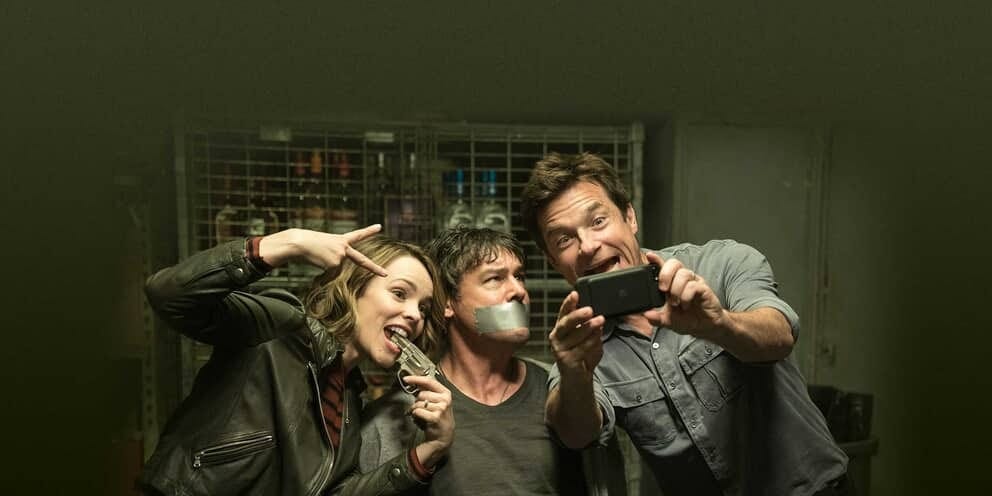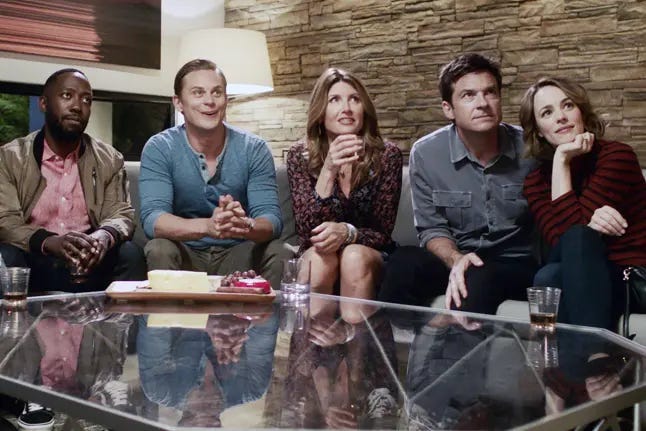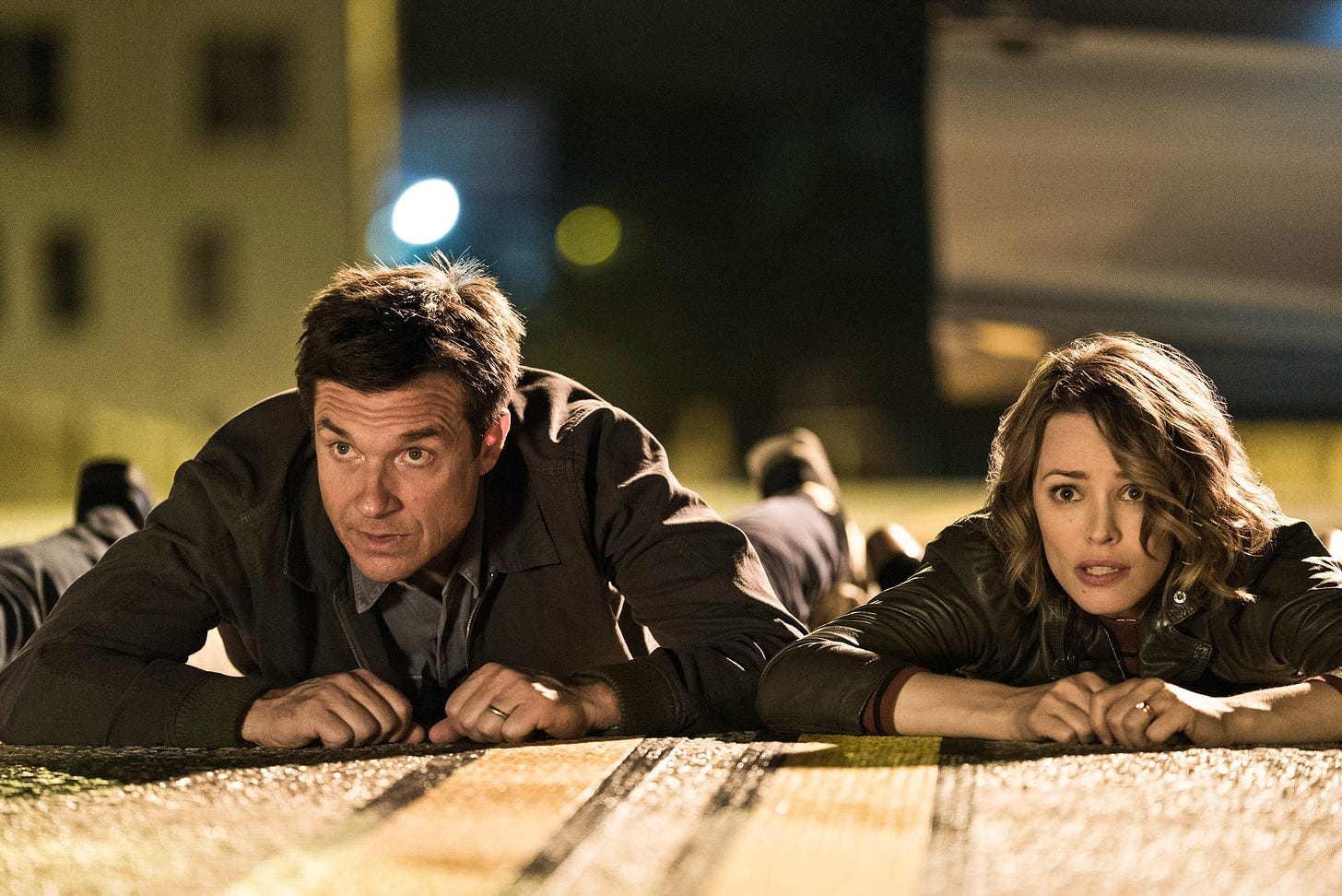Earlier this week, I slipped out to theaters to see No Hard Feelings, a new comedy starring Jennifer Lawrence as a cash-strapped gig worker who responds to a job listing from a wealthy couple looking for a young woman to “date” their introverted teenage son before he goes off to Princeton. The premise is juicy, like a Risky Business for the age of helicopter parents, only with the focus more on the (hapless, amateur, would-be) sex worker than the virginal high schooler taken on a ride. The trailer is terrific, too, suggesting the sort of red-band raunch that mainstream comedies have been shy about delivering. Then there’s Lawrence herself, an actress who doesn’t get enough opportunities to bring her real-life personality—frank, funny, with a knack for comic trainwrecks—to the big screen. (This was the revelation that Albert Brooks made about Meryl Streep after meeting her at a party and wanting that Meryl Streep to star in Defending Your Life.)
What I discovered is that No Hard Feelings is a bit of a shambles, unsteady in its frequent swerves from the ribald to the sentimental and wildly at odds with itself on whether it wanted to be a humble, sweet, character-based comedy or an outrageous and larger-than-life. The best scenes involve Lawrence, as 32-year-old fuck-up Maddie Barker, throwing herself at the terrified, overmatched Percy (Andrew Barth Feldman) to score a quick seduction and win the Buick Regal his parents have promised her. She comes on like a steamroller and winds up flattening him.
But as the two characters start to negotiate something like an authentic relationship, the film also feels inclined to punch up the action with events that would never happen in real life. There’s a scene where Maddie speeds past a moving train with Percy clinging to the roof of her car—which, it should be said, could have killed them both. And a much-ballyhooed scene where Maddie goes after three kids who try to steal her and Percy’s clothing during a skinny-dipping session would play much better if she didn’t suddenly turn into Viggo Mortensen in Eastern Promises. It’s funny that Maddie is brash and unashamed enough to come out of the water naked and get the clothes back, but nothing that happens in the actual fight resembles what a normal human could do. Moments like these do immense damage to a film that needs to be low-key.
But the pressure to include them now feels like a natural trade-off in 21st century Hollywood, the only way a studio will bankroll a comedy that’s not based on preexisting IP. You sell the big setpieces and then try to smuggle in a film that’s perhaps more identifiable. Sometimes those setpieces are close enough to real human behavior to get a pass—the pastry-boning in American Pie, the chest-waxing in The 40-Year-Old Virgin—but they’re more often conspicuously amped-up, like the characters in Bridesmaids contending with food poisoning in the middle of a dress-fitting session. (Indeed, Kristen Wiig later admitted she hated the scene, which wasn’t originally in the script, and was encouraged to add it.) It’s not enough for a comedy to work on its own terms, even one with a big, provocative hook like No Hard Feelings. It has to be scaled like a blockbuster, the thinking goes, or no one will show up to the theater.
Under those terms, John Francis Daley and Jonathan Goldstein’s Game Night is the ideal 21st century blockbuster comedy, because it doesn’t have to contort itself to play by the current set of rules. It’s not about ordinary people who behave in ways that are contrived and unrecognizable. It’s about ordinary people who are thrust into an extraordinary situation and have to react, which certainly pushes Game Night into moments of comic absurdity, but always with the recognition that they don’t belong in shootouts or black-market spy games. The laughs spring naturally from the tension between the movie-like action of the criminal underworld and a few cute couples who thought they were in for another evening of charades and Tostitos Scoops.
Daley and Goldstein, who would go on to direct a Dungeons & Dragons movie that’s smarter and more entertaining than it had any right to be, have a stylistic robustness that elevates the film well before any danger encroaches on its characters. The opening montage, set to Queen’s “Don’t Stop Me Now,” zips breathlessly from a meet-cute between competitive gamers Max (Jason Bateman) and Annie (Rachel McAdams) to an engagement proposal via charades to an arcade wedding dance, all while dropping clever observations like the fact that the answer to most trivia questions about the Supreme Court is “Oliver Wendell Holmes.” It takes startlingly little time to establish the win-at-all-costs zeal that brings Max and Annie together, two adorable psychos so addicted to competition that they play paper football before a meeting with their fertility doctor.
The other character introductions are similarly deft: Max and Annie have their game nights with Kevin (Lamorne Morris) and Kylie (Bunbury), a couple that’s been together since they were 14 (save for one eventful separation period), and Ryan (Billy Magnussen) and whatever dim Instagram influencer he brings along as a date. On the sidelines is Max and Annie’s neighbor Gary (a scene-stealing Jesse Plemons), a mirthless cop who used to love to attend game nights with his wife, but is now just the weirdo next door since their marriage fell apart. The wild card in the mix is Max’s older brother Brooks (Kyle Chandler), whose success and handsomeness are an ongoing torment that Brooks likes to exacerbate by doing things like buying Max’s dream car.
The hook in Game Night is that Brooks, eager again to outdo his little brother, has arranged an interactive role-playing mystery game in which he’s kidnapped and the three couples have to follow clues to find him. The game is so realistic, in fact, that when actual kidnappers turn up to beat him senseless and drag him away, the others casually nod their heads in appreciation of the blocking. (“And the Independent Spirit Award goes to…”) Daley and Goldstein, working from Mark Perez’s script, can’t keep the participants in the dark for too long, but the stretch where Max and Annie still think it’s a game and the panicked scenes when they finally realize it isn’t may be the funniest in the film. McAdams swirling her hips at the dive bar where Brooks is being kept, whipping a presumed prop gun at the presumed phony kidnappers, and busting out a dead-on impersonation of Amanda Plummer in Pulp Fiction is absolute bliss. True to character, Annie is playing this game to the hilt.
The shift into action-comedy that follows gives Game Night the requisite scale without trampling over the characters that it has sketched off so efficiently. Ryan’s decision to bring a ringer to the table for the first time pays off, with the seasoned comic actress Sharon Horgan stepping in as Sarah, a co-worker who rolls her eyes at his affable idiocy while betraying an unmistakable love of adventure. Their odd couple dynamic—a scene in which Ryan tries to bribe the game company by sliding the $17 he has in his wallet, bill by bill, is particularly funny—plays a little better than Kevin and Kylie’s ongoing conflict over the celebrity Kylie supposedly slept with when they were on a break. But Daley and Goldstein are able to tap the brakes enough on the action to give each of these pairs some moments to breathe.
For Max and Annie, the entire ordeal winds up playing out a little like the machinations in David Fincher’s The Game, which were intended to restore confidence and meaning to the player. Max’s anxieties are blamed for the couple’s infertility problems, and the events of the night, combined with revelations about Brooks’ flimsy criminal lifestyle, improve his morale and prove how well he and Annie work as a team. The film’s funniest scene, in which Annie tries to remove a bullet from Max’s arm using improvised tools from drug store (a bottle of wine for sterilization, a pocket knife for the incision, a squeaky toy for him to bite on) and instructions from a militia website has an underlying sweetness to it, too. They’re a great couple. And there’s no game they can’t win together.
The film’s most memed moment also underlines how beautifully it manages the interplay between cartoonish Hollywood action and something approximating real human behavior. When a Bulgarian henchman who has Annie cornered on a tarmac gets sucked into a plane engine, her first reaction (“Yes!”) and her second (“Oh no, he died!”) teases our own natural response to studio escapism. We’ve seen bulky henchmen get ripped apart by airplanes before—this is how an overmatched Indiana Jones lives through Raiders of the Lost Ark—but not from the perspective of someone who would never expect to see it happen in front of her. An action beat becomes another character moment. (And evidence that McAdams is one of most versatile and undervalued actors on the planet.)
That Game Night is constructed so savvily as a blockbuster comedy is, of course, a victory for Daley, Goldstein and Perez, but it’s also an example of how distressingly narrow the path has become for films like No Hard Feelings, which can’t contort themselves so gracefully. Audiences have been conditioned to associate movie theaters with visceral thrills, which is fine enough for action tentpoles and busy computer-animated films and a genuinely exciting wave of original horror movies. But we’re now living through a period where The Hangover—or, if you’re feeling more generous, Talladega Nights—has set the bar for what comedies need to be, big and loud and anti-human. Game Night may be the best we can expect.







Oh man, I cannot believe how well this movie works. I still think about Plemons in this.
I am routinely outraged that McAdams isn't widely understood to be one of the best comedic actors around. She's good in all kinds of roles but good god can she sell a laugh.
I’m surprised the comparison never struck me before, but the film Game Night most reminds me of is the late-’90s Bill Murray vehicle The Man Who Knew Too Little, which has a similarly breezy feel. The difference is Murray never has a full understanding of the situation he’s landed in -- at all times, he thinks it’s an interactive adventure set up by his more successful brother -- but he nonetheless comes through the other side unscathed.